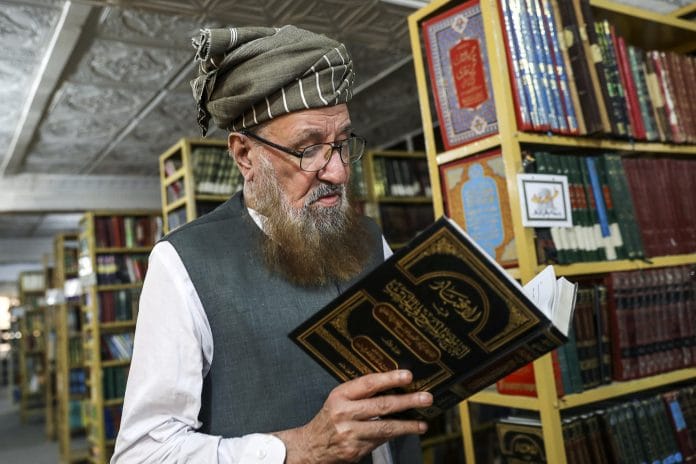Maulana Samiul Haq has said matters of ‘such a great importance’ shouldn’t be left solely to the US.
A Pakistani Islamic cleric who taught the Taliban’s leaders has called on China to play a larger role in negotiations to end the 17-year Afghan conflict.
Beijing’s stake in regional peace is larger than America’s, Maulana Samiul Haq, who is known as the ‘Father of the Taliban,’ said in an interview at his seminary near the northwestern city of Peshawar. Haq, who is believed to be in close contact with the Afghan Taliban and schooled its present chief, Haibatullah Akhundzada, said China would be welcomed as an arbitrator in negotiations and shouldn’t “leave matters of such a great importance solely to the U.S.”
China has long been concerned about Afghanistan’s instability spilling across its border. The East Turkestan Islamic Movement, a separatist militant group formed by members of China’s Muslim Uighur community, has in the past operated in both Afghanistan and Pakistan. Now Beijing is allegedly cracking down on ethnic Uighurs in its vast Xinjiang province that borders both nations.
As U.S. President Donald Trump tentatively renews direct talks with the Taliban in a bid to end America’s longest war, Haq said peace negotiations can succeed if Washington announces a troop withdrawal date. His comments illustrate the conflict’s complexity and influence wielded by Pakistani actors. Although Islamabad has acted against militants that threaten Pakistan domestically, the U.S. accuses the country of supporting insurgents who strike inside Afghanistan.
“The U.S. should welcome a greater role by China in the Afghan peace process,” said Joshua White, a former director for South Asian affairs at the U.S. National Security Council and now non-resident fellow at the Brookings Institution. “Perhaps the most useful thing that China can do is to encourage better ties between Pakistan and Afghanistan, which would contribute to the stability of the Afghan government and bolster its negotiating position.”
Troop Withdrawal
China’s government last month denied reports it had quietly increased its security presence in the country and built a military base in Afghanistan. However, it has increased economic aid and investment in the war-torn nation in recent years, including rail links.
“As long as there is an opportunity, China will promote peace talks in a private way,” said Shi Yinhong, a foreign affairs adviser to China’s State Council and professor at Renmin University. “Some people wish China could provide more resources or even to send military forces, but this is not appropriate.”
The Taliban, like 82-year-old Haq, see the Afghan government as illegitimate and demand a withdrawal of foreign soldiers as a precursor to peace. When Trump last year increased troop numbers he purposefully declined to set a timeline that would allow the insurgent group, that controls or contests about half the country, to wait out the U.S.
“These peace talks can be fruitful only when the U.S. comes up with a clear agenda for withdrawing its troops from Afghanistan,” said Haq, a turbaned preacher whose Darul Uloom Haqqania madrassa is known as the ‘University of Jihad’ and currently houses 4,000 students in an eight-acre compound in the small town of Akora Khattak. It still has more than 200 Afghan ‘Taliban’, a Pashto word for ‘students’, all of whom are registered with Islamabad as refugees.
It was the Soviet invasion of Afghanistan in 1979 that first saw young Afghan and Pakistani students from Haq’s seminary cross the border to fight. The Mujaheddin were at the time aided and supplied by the U.S. Central Intelligence Agency as part of a Cold War effort to defeat the Soviets.
Closed Doors
After the Sept. 11 attacks, many madrassas in Pakistan allegedly supplied young militants to fight the U.S. and allied forces in Afghanistan. Among the 30,000 books in the huge library of Haq’s seminary are works penned by Abdullah Yusuf Azzam, a co-founder of al-Qaeda with Osama bin Laden.
Haq warned the U.S. against keeping peace talks behind closed doors, which may mislead the Taliban’s rank-and-file into thinking their mediators are making questionable compromises while they fight on the battlefield.
Haq also offered to help with the negotiations. However, he said Pakistan’s Prime Minister Imran Khan, whose party has been criticized for spending development funds on the cleric’s madrassa, hasn’t yet asked him for assistance. Khan has many times stated that the best way to end the Afghan war is via a settlement with the insurgent group and denies accusations that he supports extremism.
While asking China to get more involved in the conflict, Haq urged Pakistan’s premier to treat Beijing with caution as he looks for outside assistance in dealing with a worsening financial crisis. Critics of the China’s Belt and Road project claim that many developing countries, including Pakistan, are being ensnared in debt diplomacy with billions of dollars of loans they will struggle to repay.
“I don’t approve of a relationship that leads us to slavery,” said Haq. “Given their handling of Muslims at home, the Chinese will behave like the British East India Company once they dig their feet deeper in Pakistan,” he said, referring to the colonial-era trading company that led to the British occupation of the Indian subcontinent — Bloomberg






